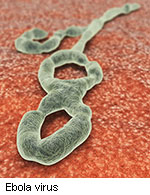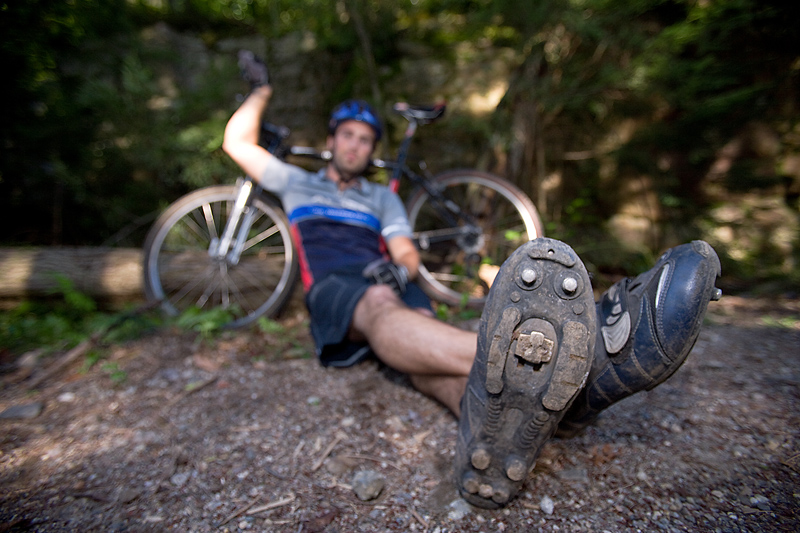
THURSDAY, Sept. 25, 2014 (HealthDay News) — The third American medical missionary infected with the deadly Ebola virus while working in West Africa left a Nebraska hospital Thursday, free of the virus.
The treatments given to Dr. Rick Sacra, 51, included doses of an experimental drug and blood transfusions from a fellow U.S. medical missionary who also survived infection with the highly lethal virus.
“The CDC [U.S. Centers for Disease Control and Prevention] has declared me safe and free of virus,” Sacra announced during a morning news conference at Nebraska Medical Center in Omaha. “Thank God. I love you all.”
Sacra said he feels “great, except that I am extremely weak.” He noted that he can now spend up to five minutes on an exercise bike without feeling exhausted the next day.
Sacra said his friend and fellow medical missionary and Ebola survivor, Dr. Kent Brantly, “communicated with me about a week ago and let me know in no uncertain terms that this was not going to be a quick recovery. So I have to take things one day at a time.” Brantly gave blood to Sacra in the hope that antibodies to the Ebola virus would aid Sacra in his recovery.
During his fight with Ebola, Sacra suffered classic symptoms — fever, vomiting, diarrhea and aches. But, he never developed the extensive bleeding that comes in advanced stages of the hemorrhagic viral infection.
Sacra fell ill with Ebola on Aug. 29, about a month after arriving in Liberia as a medical aid worker volunteering with the missionary organization SIM USA.
He had been treating very sick pregnant women when he contracted the disease. “I know it was one of the people I did a C-section on,” he said at the news conference. “We were wearing standard protective gear, but obviously something didn’t go right somewhere. Labor and delivery and C-sections are chaotic, and we didn’t have adequate staffing.”
Sacra said he holed up in his bedroom for three days after noticing he had a fever. Blood tests performed by a CDC mobile lab on the third day determined he had been infected.
Things moved quickly after that. He began feeling truly sick on day four, and by day six he was on a plane headed back to the United States for care.
Sacra entered the Nebraska Medical Center’s isolation unit on Sept. 5. The day he arrived, doctors began treating him with an experimental drug called TKM-Ebola, which disrupts the Ebola virus’ ability to replicate.
Sacra also received two transfusions of blood serum from Brantly, the first American to be infected with the virus during the West African outbreak. The men are good friends and both work for missionary groups active in the fight against Ebola in West Africa.
Nebraska hospital officials said Thursday that they don’t know what helped Sacra survive his ordeal — the experimental drug, the transfusions, the supportive care provided by doctors and nurses, or the combination of all three.
Both Brantly, 33, and a second American aid worker, Nancy Writebol, 59, made a full recovery from Ebola following treatment with another experimental drug called ZMapp at Emory University Hospital in Atlanta. Writebol is a SIM USA colleague of Sacra’s.
A fourth infected American, so far unidentified, continues to undergo treatment at Emory University Hospital.
The Ebola epidemic in West Africa is the worst ever outbreak of the viral disease. So far, 6,263 people have become infected and 2,917 have died in the countries of Guinea, Liberia, Nigeria and Sierra Leone, according to the World Health Organization.
The epidemic could strike as many as 1.4 million people by mid-January unless the global community mounts a rapid response to the crisis, according to estimates released Tuesday by the CDC.
Sacra, a Massachusetts native, considers Liberia his second home, having lived there for 15 years from 1995 to 2010. “I think the odds I’ll be back there are very high,” he said.
When he returned to Liberia on Aug. 4 as a volunteer aid worker, Sacra found himself struck by the changes that Ebola had wrought on the country — particularly the fact that no one touches each other anymore.
“Some people, when they greet you, they will shake your hand for three minutes or four minutes,” he said. He found it “heart-wrenching” that his friends now were resorting to air handshakes.
The U.S. Food and Drug Administration in August enabled TKM-Ebola’s use during the current epidemic even though it hadn’t been rigorously tested on people.
The FDA has asked the drug’s maker, Canadian company Tekmira Pharmaceuticals Corp., for additional information to ensure the drug is safe at higher doses.
More information
For more on the Ebola virus, visit the U.S. Centers for Disease Control and Prevention.
Copyright © 2026 HealthDay. All rights reserved.

